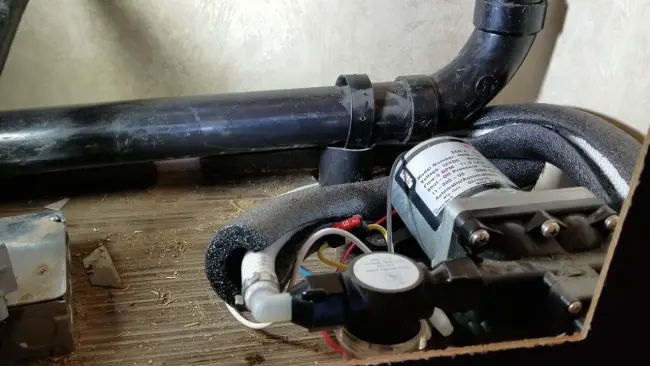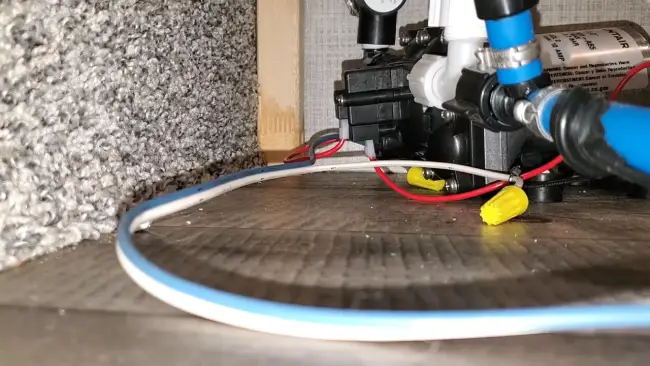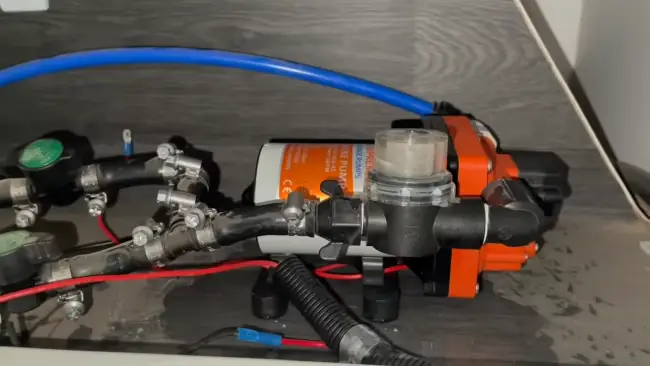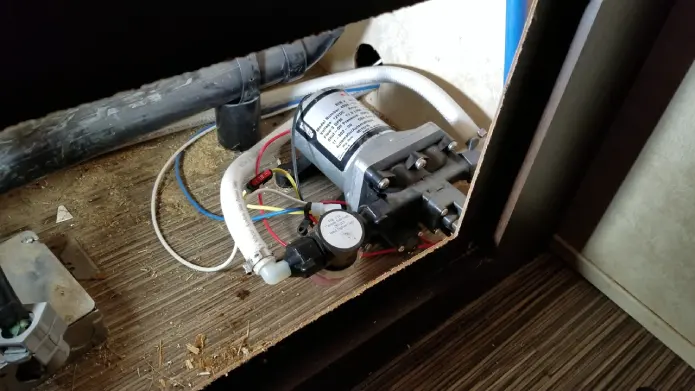Last Updated on June 26, 2023
An RV water pump’s constant buzzing and clanking can interrupt your peace, especially when relaxing or sleeping in your RV. But, there are proven strategies to minimize the noise and tranquilize your RV environment.
If you’re seeking a remedy, employing a pump silencing kit is an effective option to consider. Also, you can mount the water pump on a board wrapped with neoprene or soft rubbery material, which helps dampen the pump’s vibrations and noise.
Another effective technique is installing an accumulator in the water system. An accumulator lowers the pump’s frequency through pressure, thereby reducing noise levels and preserving your peace.
Let’s talk about how to silence that annoying RV water pump. We’ll give you all the details, so keep reading.
A Guide on How to Quiet RV Water Pump

If you’re tired of the noisy water pump in your RV, there are a few things you can do to quiet it down. Here’s a quick look:
- Use a Pump Silencing Kit
- Mounting and Insulation
- Accumulator Installation
- Place Ball Valve and Schrader Valve
- Secure PEX Piping
- Air Outlet Vents
- Flooring Considerations
Let’s take a closer look at these points in detail:
1. Use a Pump Silencing Kit
If you install a pump silencing kit with special nylon braided hoses, you can easily reduce noise and vibrations in your water system.
These hoses are designed to isolate the vibrations produced by the pump, which can help reduce the noise that is transmitted throughout your RV.
Also, the kit may include other components such as mounting brackets and insulation materials that can further reduce the noise level.
To install the pump silencing kit, turn off your water pump and drain the water lines. Then, follow the instructions provided with your kit to connect the nylon braided hoses to your pump and water lines.
After securely attaching the hoses, you can install any mounting brackets or insulation materials as directed. Once everything is in place, turn on your water pump and test for any remaining noise.
2. Mounting and Insulation
A neoprene-wrapped board provides an additional layer of insulation, which reduces noise transmission. This simple step will go a long way in reducing the annoying noise the pump produces.
- Here are some tips to guide you on how to mount and insulate your water pump:
- Choose a board that’s slightly larger than the pump’s base to ensure stability.
- Wrap the board with neoprene or a soft, rubbery material that’ll absorb vibrations and reduce noise transmission.
- Use screws or bolts to securely attach the pump to the board, ensuring it’s level and stable.
After mounting and insulating your water pump, the next step is to install an accumulator to reduce noise further and increase pump efficiency.
3. Accumulator Installation
Adding an accumulator is like giving your pump a power-up, reducing its workload and making it run smoother.
An accumulator is a tank that stores water under pressure, which helps to build up pressure in the system. This reduces the need for the pump to cycle as frequently when you open the tap, resulting in less noise from the pump.
Installing an accumulator is a relatively simple process. You need to turn off the water pump and drain any water remaining in the system.
Then, connect the accumulator to the water system using a T-fitting. Install the accumulator as close as possible to the pump and use appropriate fittings and seals.
With the accumulator installed, you can move on to the next step of placing the ball valve and Schrader valve.
4. Place Ball Valve and Schrader Valve
Your RV water pump will also be quieter if you install a ball and Schrader valve. Installing these valves in your system allows for easy disconnection and water removal. Here’s how to do it:
- Locate the main connection point of your pump system. This is usually where the water hose connects to the RV.
- Install a ball valve at this point. This will allow you to easily disconnect the water hose without water returning to the system.
- Next, install a Schrader valve. This will allow you to push air through the lines for water removal, preventing noise issues.
If you want to further quiet your RV water pump, you should also consider installing a check valve between the ball valve and the Schrader valve. A check valve will prevent backflow of water into the system and ensure that water is only pushed out when you add air through the Schrader valve.
5. Secure PEX Piping
Another effective way to reduce the noise from your RV water pump is to secure the PEX piping using small wire clips designed for holding wires.
Loose pipes can vibrate or bang against other surfaces, which can lead to a noisy installation.
Use the clips to secure pipes in specific places to avoid this problem. The clips keep the pipes from moving around and make for a quieter ride.
6. Air Outlet Vents
Install air outlet vents to direct air upward out of the tank and down to reduce RV water pump noise. This design lets air out of the tank and shows when it’s full, preventing excess noise from trapped air. The vents can also be used to reduce the pressure buildup in the tank, which can further reduce noise levels.
7. Flooring Considerations
Choosing the right flooring materials is crucial for preventing water damage and reducing noise from RV water pumps.
When selecting your RV’s flooring, make sure that it can withstand water damage and has proper drainage capabilities. This is especially important in case of leaks or spills, as proper drainage can prevent water from pooling and causing noise issues.
Also, you may want to consider installing a sound-dampening underlayment beneath your RV’s flooring to reduce noise levels further.
What causes the RV water pump to be noisy?

Various factors can cause a noisy water pump in your RV. It can be due to air in the system, worn-out parts, loose connections, excess vibrations, or a dirty water supply.
Air trapped in the pump or water lines can vibrate or chatter as the pump tries to push water through. This can happen if there are leaks in the plumbing system, allowing air to enter.
A worn-out or damaged water pump can also cause increased noise during operation. Over time, the pump’s internal components may become worn or the pump itself may develop a defect, leading to a noisy operation.
If the RV water pump is not properly secured or mounted, it can produce excess vibrations, resulting in a noisy operation. Ensure that the pump is properly secured and mounted to reduce vibrations and noise.
The water source itself can contribute to the noise. If the water supply has high sediment, debris, or mineral levels, it can cause the pump to work harder and generate more noise.
How do I know if my RV water pump is bad?
If your RV’s water pressure is lacking or the pump is constantly running, it could be a sign of a malfunctioning water pump.
Another common indicator of a problematic water pump is unusual noises like grinding, whining, or vibrating sounds. These noises could suggest mechanical issues within the pump that require immediate attention.
If the pump keeps cycling, it could be a pressure switch problem or a leak even when water isn’t being used. Inspecting the pump for any leaks, cracks, or damage can also help identify a potential problem.
How long does an RV water pump last?

An RV’s water pump’s lifespan can vary based on usage, maintenance, and pump quality. But a well-maintained pump can typically last between 5 to 10 years.
Regular maintenance is key to prolonging the lifespan of your water pump. To keep your pump running smoothly, keep it clean, check for leaks, and ensure proper voltage and pressure.
The life of your pump can be extended with regular maintenance and a high-quality pump from a reputable manufacturer. The cost of a pump with a good reputation may be higher upfront, but it can save you money in the long run.
Silence Your RV Water Pump for Peaceful Nights on the Road
You now know how to quiet your RV water pump and enjoy peaceful nights on the road. Remember, various factors, such as air in the system, loose fittings, or worn-out parts, can cause a noisy pump.
Following the steps outlined in this article, you can troubleshoot and fix the problem quickly. But don’t forget that prevention is always better than cure. Regular maintenance, such as cleaning and lubricating the pump, can extend its lifespan and prevent costly repairs.
So, take care of your RV water pump, and it’ll take care of you, providing a reliable and quiet water supply wherever your travels may take you.



